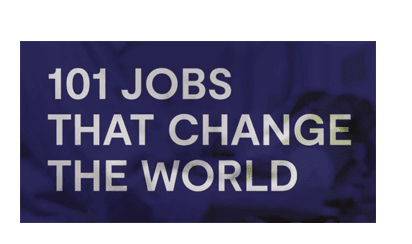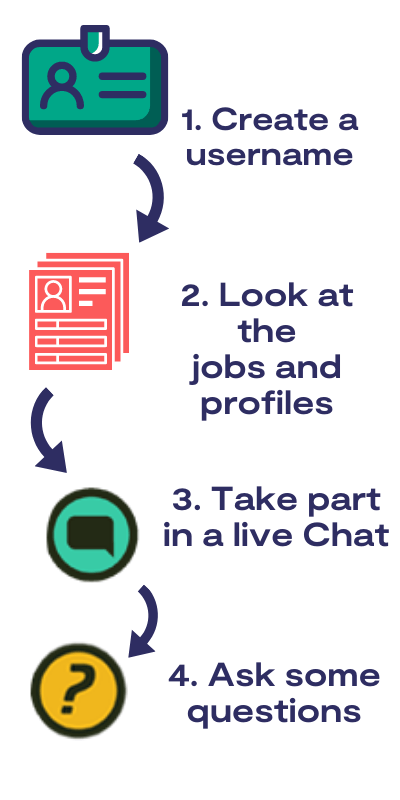Schools are challenged to create an effective careers programme with often limited resources. Careers Advisors are increasingly being measured against the Gatsby Good Careers Guidance Benchmarks1.
Taking part in 101 Jobs that Change the World can help support a school’s career programme.
1. A stable careers programme
Every school and college should have an embedded programme of career education and guidance that is known and understood by pupils, parents, teachers, governors and employers.
101 Jobs follows a clear pattern of activity that is recognisable to teachers and easily understood by students of all abilities and ages. The strong format and branding communicates to teachers the careers guidance opportunity regardless of subject.
 2. Learning from career and labour market information
2. Learning from career and labour market information
Every pupil, and their parents, should have access to good quality information about future study options and labour market opportunities. They will need the support of an informed adviser to make best use of available information.
During the activity students get direct contact with people working in a broad range of jobs related to research. Students are able to ask whatever they want about careers.
3. Addressing the needs of each pupil
Pupils have different career guidance needs at different stages. Opportunities for advice and support need to be tailored to the needs of each pupil. A school’s careers programme should embed equality and diversity considerations throughout.
The activity is student-led, with students able to pose the questions most important to them as individuals, to the professionals most relevant to their personal interest. The questions they ask reflect their current stage when thinking about careers – one Y9 may ask for GCSE advice, while another might want to know about work experiences, or the UCAS application process.
4. Linking curriculum learning to careers

All teachers should link curriculum learning with careers. STEM subject teachers should highlight the relevance of STEM subjects for a wide range of future career paths.
The student-led nature of 101 Job mean that conversations revolve around a mixture of subject specific questions and careers/education questions, based on the interests of the students. Professionals often link subject-specific questions to their work and careers, and their varying careers demonstrates the value of STEM subjects for a range of future professions.
5. Encounters with employers and employees
Every pupil should have multiple opportunities to learn from employers about work, employment and the skills that are valued in the workplace. This can be through a range of enrichment activities including visiting speakers, mentoring and enterprise schemes.
Every student taking part in the activity has the chance to connect with a wide range of professionals in different work environments. The professionals involved are working for a range of employers, which is especially useful to students from schools in areas where employer diversity is limited.
The online, informal, pseudonymous nature of the activity provides students with direct and authentic encounters in a manner unmatched by more formal face-to-face meetings.
Through their conversations, professionals communicate to students the skills that are valued in the workplace, and what it is like to work in their field on a day-to-day basis – they’re not just showcasing the best parts.
6. Experiences of workplaces
Every pupil should have first-hand experiences of the workplace through work visits, work shadowing and/or work experience to help their exploration of career opportunities, and expand their networks.
Some things don’t work so well online.
 7. Encounters with further and higher education
7. Encounters with further and higher education
All pupils should understand the full range of learning opportunities that are available to them. This includes both academic and vocational routes and learning in schools, colleges, universities and in the workplace.
The activity will normally include a mixture of professionals, some of whom have taken a vocational, others an academic route. Some are fairly recent graduates with current experience of higher education and apprenticeships, able to offer relevant advice and insights to students.
Profiles often include links to employers and educational facilities, and, where available, links to more information about entry routes to their profession.
For more information about the Gatsby Benchmarks, see goodcareerguidance.org.uk
Get in touch with us: admin@imascientist.org.uk or call 01225 326 892








